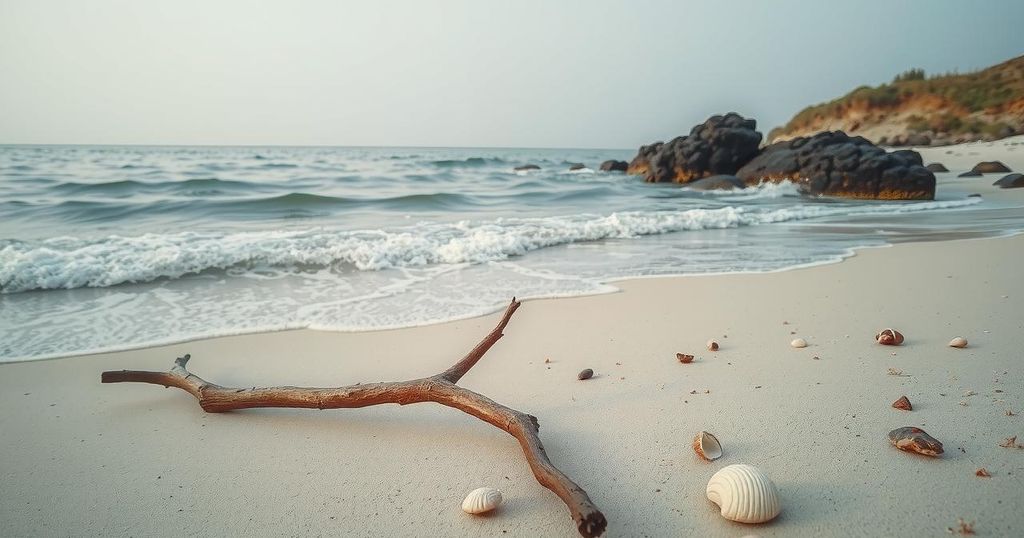Rising Sea Levels: The Urgent Crisis in Guinea-Bissau
Guinea-Bissau faces a severe threat from rising sea levels, impacting villages like Djobel. Coastal residents confront poverty as seawater devastates agriculture, poisons freshwater supplies, and jeopardizes homes. Despite minimal contributions to global greenhouse gas emissions, these communities suffer extensively from climate change, highlighting the urgent need for climate justice.
Rising sea levels pose a critical threat to coastal communities in Guinea-Bissau, driving many residents into extreme poverty. Villages such as Djobel are facing potential extinction as seawater infiltrates farmland, contaminates drinking water, and demolishes homes. This stark reality calls for urgent action towards global climate justice, as Guinea-Bissau’s minimal greenhouse gas emissions disproportionally affect its communities amidst the climate crisis.
Aghoti Sanhan, a 70-year-old village resident, reflects on the dire situation, stating, “The sea keeps coming towards us. The fields have been ruined by the seawater. Land is getting smaller, and many people have abandoned the village.” Her words encapsulate the profound despair and urgency felt by many residents.
On a recent visit to Guinea-Bissau, it became clear that rising sea levels have serious ramifications, especially for clusters of low-lying coastal areas. The disruption from increased rainfall and storm surges since the early 2000s has driven thousands into poverty, as their agricultural and fishing-based livelihoods collapse.
Guinea-Bissau, covering approximately 36,000 square kilometers, houses around 2.1 million individuals, with around 70% living on less than $1.90 per day. Reaching the coastal village of Djobel entails a lengthy journey from the capital, Bissau, where residents depended on fishing and farming. However, multiple factors have driven this village to the brink of disappearance due to rising seawater levels.
Baciro Nango, the village head, remarked, “About 20 years ago, the climate and the sea started to change drastically. During the rainy season, the whole village sinks underwater.” He emphasized the dire condition of the agricultural lands, noting that recent floods have wreaked havoc on their crops, leaving little hope for survival.
The threat of fresh drinking water is particularly severe, as seawater has contaminated the well that once provided for the villagers. Women and children now embark on a treacherous four-hour boat journey to secure potable water, a testament to the profound challenges they face.
A dire glimpse of the future looms as uninhabitable land now lies covered in salt, rendering significant portions of farmland inactive. Abandoned properties serve as haunting reminders of life that once thrived on these shores, now reduced to vestiges beneath the encroaching tide.
According to the Intergovernmental Panel on Climate Change (IPCC), global sea levels have already risen by an average of about 20 centimeters since 1900. As temperatures rise and ice melts, predictions indicate that even with aggressive mitigation efforts, sea levels could rise significantly more by the century’s end, fundamentally jeopardizing livelihoods.
Joao Tchedna, Primary Director General of the National Environment Institute of Guinea-Bissau, stated, “We have very little technology or money to deal with the impact of the climate crisis. The damage is already irreversible.” This sentiment highlights the dire situation faced by communities like Djobel, underlining the crucial need for support from the international community.
One potential solution for the villagers was resettlement further inland, supported by the UN. However, plans were met with local resistance, culminated in conflict between nearby villages, which resulted in violent outcomes. Efforts to establish new water supply systems and housing at a proposed site have been destroyed, leaving the future uncertain.
As Tchedna noted, developed nations must significantly contribute to international climate funds, particularly as Guinea-Bissau accounts for a mere 0.09% of global greenhouse gas emissions. The villagers of Djobel, who produce almost no emissions themselves, are among the first adversely affected by the climate crisis ignited by industrialized nations, necessitating immediate calls for climate justice.
Guinea-Bissau is one of West Africa’s poorest nations, located along the coast and experiencing significant vulnerabilities to climate change impacts, particularly rising sea levels. Many communities rely on fishing and agriculture for their livelihoods, making them highly susceptible to environmental shifts. Rising sea levels threaten their homes, contaminate freshwater resources, and diminish viable farmland, pushing thousands into deeper poverty and driving migration away from the coast. The growing inequities driven by climate change underscore the need for a concerted global response to support affected communities and address the injustices faced by nations with minimal contributions to climate change. The planet’s atmospheric and ocean conditions have been altered markedly through global warming, with coastal regions like Guinea-Bissau standing as critical frontlines of this crisis. Despite their negligible contribution to greenhouse gas emissions, these communities bear the brunt of adverse effects, highlighting the essential nature of climate justice in ongoing discussions surrounding climate action and international accountability.
In conclusion, the plight of coastal communities in Guinea-Bissau, particularly in villages like Djobel, underscores the severe implications of rising sea levels and climate change. Their agricultural and fishing-based livelihoods are under siege, propelling many towards extreme poverty. The disproportionate effects faced by these communities reflect a pressing need for global climate justice and support from developed nations. Without adequate resources and action, the consequences for people in Guinea-Bissau will continue to worsen, emphasizing that climate change is not merely an environmental issue but a profound humanitarian crisis.
Original Source: www.weforum.org




Post Comment